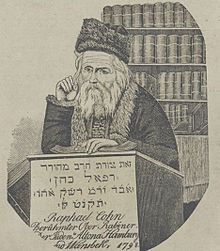Raphael Cohen
| Rabbi Raphael Susskind Cohen | |
|---|---|
| Rabbi | |
 |
|
| Personal details | |
| Birth name | Rafael ben Jekutiel Süsskind Kohen |
| Born | 4 November 1722 |
| Died | 11 November 1803 (aged 81) Altona |
| Father | Jekutiel |
Rabbi Raphael ben Jekuthiel Susskind Cohen, in German Rafael ben Jekutiel Süsskind Kohen (Lithuania, 4 November 1722 – Altona, 11 November 1803), a kohen, was Chief Rabbi of Altona-Hamburg-Wandsbek from 1775.
He was educated at Minsk under Aryeh Löb ben Asher, whose successor as head of the yeshibah of that town he became in 1742. In 1744 he was called to the rabbinate of Rakov, and in 1747 to that of Vilkomir (a town not far from Wilna), where he remained till 1757, when he was called as chief rabbi to Minsk. Six years later he became rabbi and head of the yeshibah at Pinsk. In 1771 he went to Berlin for the purpose of publishing there his work "Torat Yekutiel." The scholars of that city received him with enthusiasm and respect, and offered him the rabbinate, which was then vacant, but for some unknown reason he declined the offer. In 1772 he became rabbi of Posen, and four years afterwards he was called to take charge of the "Three Communities" (Altona, Hamburg, and Wandsbeck).
For twenty-three years he ministered to these congregations, and then retired from active service, spending the remainder of his life among his former parishioners. How highly his work was esteemed may be inferred from the fact that the King of Denmark, to whose territory these congregations belonged, upon hearing of Raphael's resignation, sent him a letter in which he expressed his appreciation of the service he had rendered to the Jewish community.
Raphael was Mendelssohn's bitterest opponent, and attempted to ban Jewish readers from reading Mendelssohn's Biur (Pentateuch translation) while it was still in manuscript, but ultimately was unable to oppose translation of the Pentateuch when Mendelssohn arranged for the ruler of Altona, Christian VII of Denmark, to subscribe to a copy.
...
Wikipedia
